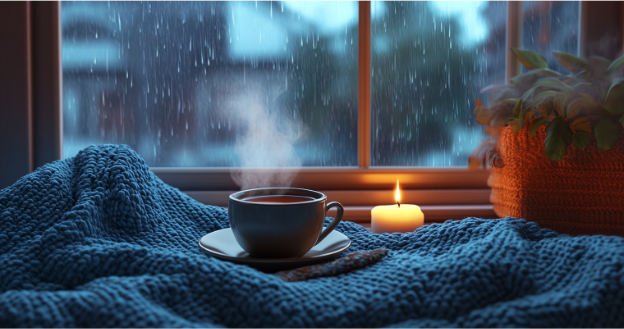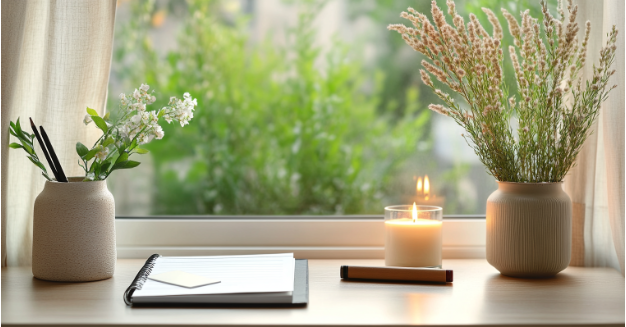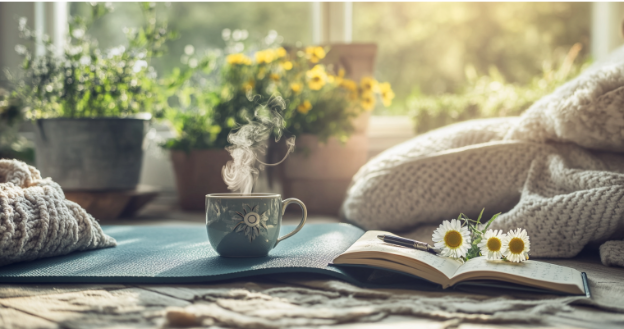Decluttering Tips to Revitalize Your Mind, Body, and Living Space
Have you ever walked into a cluttered room and instantly felt your energy dip? You’re not imagining it. Clutter does more than crowd your physical space—it weighs heavily on your mind, too. There’s a strong link between the state of your surroundings and your mental and physical well-being. Decluttering isn’t just about making your home Instagram-worthy. It’s about creating an environment that supports a vibrant, healthy life. If you think it’s time to breathe easy again, these decluttering tips will help you take back control, clear your space, and feel lighter in body, mind, and spirit.
Clutter Isn’t Just Stuff—It’s Stress
When you see piles of clutter, your brain interprets them as unfinished tasks. That’s why clutter can leave you feeling frazzled. Research shows that cluttered spaces can elevate cortisol levels, the body’s main stress hormone.
Cortisol spikes when your environment feels chaotic or out of control. Over time, this can lead to anxiety, irritability, and decision fatigue. You might even procrastinate because the mess feels too overwhelming to tackle.
Conversely, an organized space helps you feel calm and in charge. When your surroundings feel manageable, your stress levels often drop as well.
The Surprising Health Benefits of Decluttering
Decluttering isn’t just about making things look nice. Research shows it has significant health benefits for both mind and body. Here are a few of the most impactful:
- Mental Clarity: Fewer items mean fewer distractions and help your brain focus better.
- Better Sleep: Uncluttered bedrooms promote relaxation and help your mind associate the space with rest, not chaos.
- Lower Stress: A tidy environment sends soothing signals to your brain, which reduces cortisol and eases anxiety.
- Increased Energy: Decluttering gets you moving and releases feel-good endorphins. Plus, the emotional relief afterward just feels invigorating.
Why Decluttering Impacts Both Mind and Body
Have you ever cleaned out a closet and suddenly felt emotional? That's because it's never really about the stuff. It's about what it represents. Clutter isn’t just physical. It's also tied to our feelings and memories. We often hold onto things because of fear (“What if I need this later?”), guilt (“This was a gift, so I should keep it”), or nostalgia (“I’ll miss this if it’s gone”).
But when you let go of things you don’t need, you’re also letting go of the emotional baggage that comes with them. For example, donating clothes that no longer fit can feel like saying goodbye to old insecurities or an outdated version of yourself.
Even the layout of your space can impact how you feel. When clutter builds up, it blocks energy flow and makes you feel stuck or unmotivated. Feng Shui calls this energy “chi” and teaches that decluttering helps positive energy flow freely. Also, psychology shows that tidy spaces can help you focus and give you more control over your life.
Decluttering Tips to Overcome the Overwhelm
Feeling buried under clutter? You’re not alone. A messy space doesn’t just crowd your home. It weighs on your mind and energy, too. But with the right decluttering tips, you can tackle the overwhelm one step at a time. Here's how to reclaim your space and your peace of mind:
1. Start with a Win
Choose a small, manageable area, like a single drawer or a shelf. The quick progress will boost your motivation.
2. Sort with Purpose
Use the 4-box method: one box for items to keep, one for donations, one for trash, and one for things that belong elsewhere.
3. Follow the “Joy” Test
Ask yourself, “Does this item bring me joy or serve a clear purpose?” If not, let it go.
4. Declutter in Categories
Rather than tackling a whole room, focus on one category at a time, like clothes, books, or kitchen tools. This reduces decision fatigue and keeps the process manageable.
5. Time-Box the Task
Set a timer for 20-30 minutes and declutter only within that timeframe. Knowing there’s an endpoint makes it less overwhelming.
The Emotional Rewards of Decluttering
When you let go of something you don’t need, you make room for something better. Whether it’s a fresh perspective or just extra breathing room, it’s a step toward feeling lighter and more at ease.
Take that junk drawer packed with random papers, for example. Clearing it out might help you let go of worries you didn’t even realize you were holding onto. And though it's tough to part with sentimental items, letting go of them can free you to create new memories.
Sure, decluttering can stir up emotions, but it’s also incredibly freeing. Each item you let go of is a reminder that you’re in charge of your space—and your life.
Pro Tips for Maintaining a Tidy, Harmonious Space
Decluttering isn’t a one-time event. To prevent clutter from creeping back in, try these simple habits:
- The One-In-One-Out Rule: For every new item you bring into your home, let go of one old item.
- Daily Mini-Declutters: Spend 5-10 minutes tidying up each evening to keep messes from building up.
- Be Mindful When Shopping: Before buying something, ask yourself, “Do I really need this, or is it just an impulse?”
Lighten Up, Let It Go
Decluttering isn’t about the “stuff” you part with. It's about the lightness and freedom you gain back. These gentle decluttering tips will help you create a space that feels relaxing and welcoming. Start small, trust the process, and remember: letting go makes room for better things to come.
FAQs
- Where should I start decluttering? Start with a small, easy area like a drawer or shelf.
- How often should I declutter? Do a deep declutter once a year and small touch-ups weekly.
- Why does decluttering feel so emotional? Clutter often holds memories, guilt, or nostalgia, which can trigger feelings.
- What’s the easiest way to decide what to keep? Ask yourself, “Does this item serve a purpose or make me happy?”
- How can I stop clutter from building up again? Use the “one-in, one-out” rule: for every new item, let one go.
- What should I do with sentimental items? Keep only a few that truly matter, and take photos of the rest for memories.
- Is decluttering worth the effort? Yes! It reduces stress, boosts focus, and creates more peaceful spaces.
- Can decluttering help with productivity? Absolutely. An organized space helps you concentrate and feel more in control.
- What’s the best way to deal with paper clutter? Sort into “keep,” “shred,” or “recycle” piles, then digitize what you can.
- How do I involve my family in decluttering? Make it fun by setting small goals and celebrating progress together.
Want to keep the momentum going? Visit our website for even more easy-to-follow decluttering tips and tricks to create a home that supports your peace and well-being.
Trending
Get Updates
SIGN UP FOR OUR NEWSLETTER TODAY

Rainy Day Self-Care: Feel-Good Activities for April Showers Days


